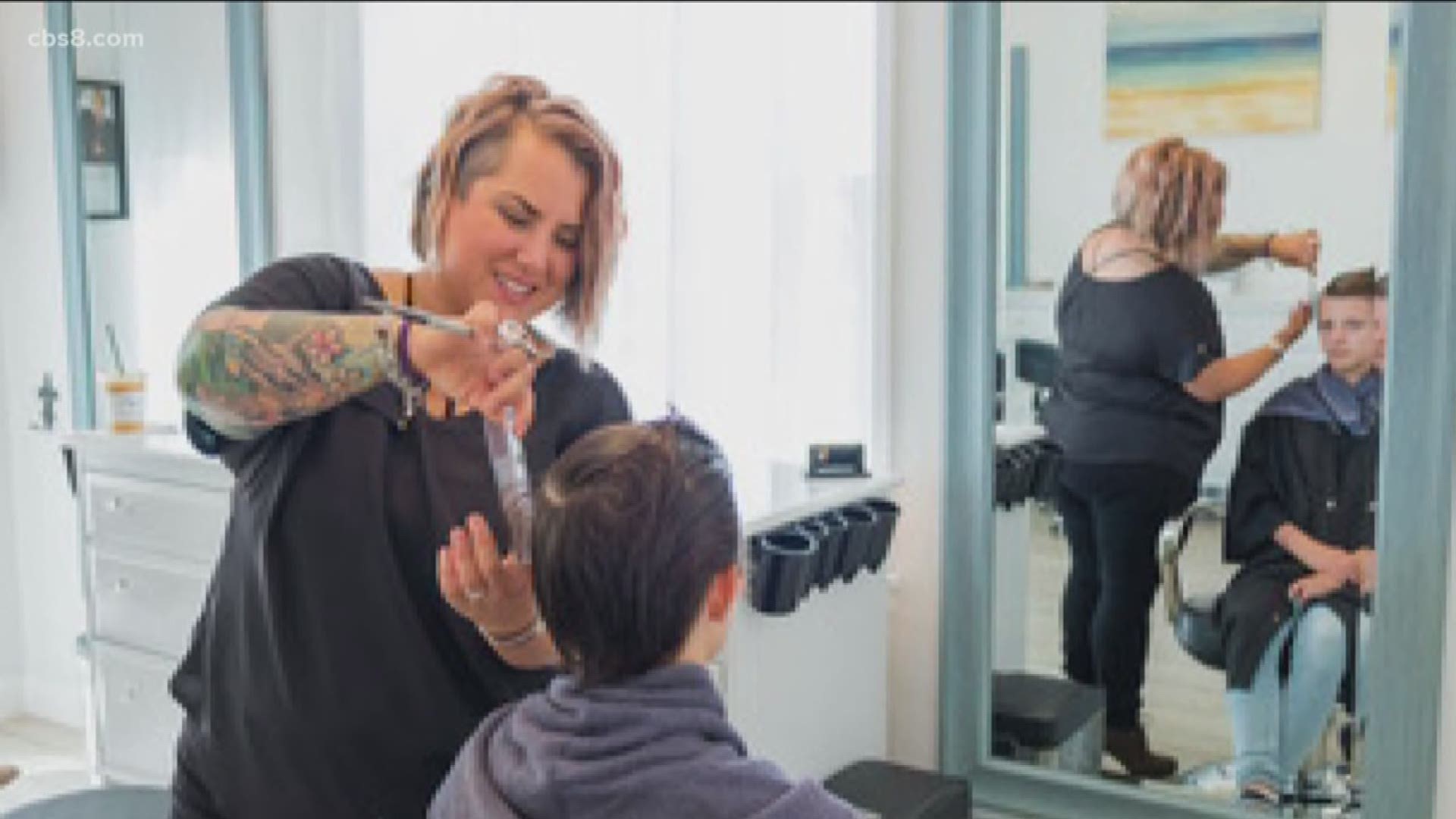SAN DIEGO — As the coronavirus - also known as COVID-19 - continues to wreak havoc on the world and workforce here in the U.S., the orders to self-isolate and social distance are affecting some jobs more than others.
Once the Governor of California ordered everyone to shelter in place unless necessary two weeks ago, Jessica Burman was out of a job.
“From that point on, the decision was made to close the doors at the salon and we’ve all been out of work since then,” she said.
As a self-employed hairstylist, Burman is one of the many independent workers struggling to make ends meet, due to not being able to work at all.
“The main thing is the income. I have none and a lot of us as self-employed people work paycheck to paycheck or client to client so to speak and we have families,” Burman said.
Those issues have become a topic of discussion on a local Facebook group for stylists trying to navigate the coronavirus crisis and find financial resources to help them.
Many are realizing they don’t qualify for traditional unemployment.
“It’s our livelihood,” said Kimberly Creekmore. “We can’t pay our rent, we can’t feed our families, we can’t get medication for sick family members.”
Creekmore, who owns Cultivate – a HairLoveDesign Salon, in La Mesa started the Facebook page back in 2012.
“I closed a day before the governor gave word to close and so I’ve seen it’s really been hard on owners and renters, on everybody,” she said.
Eight years after starting the Facebook group, it’s now a saving grace for many people in the industry trying to research the resources to help them financially through the crisis and to just vent as well.
“[It's] a way to kind of connect with other stylists and voice our frustrations,” said Burman. “It’s very difficult to figure out the whole unemployment process.”
Creekmore had to lay off an employee and even as a stylist and owner, is still trying to figure out how to save her business.
“I don’t even know what’s going to happen for us. We may close and that’s heartbreaking," she said.
Below are links people facing similar struggles can access for help:
Another program is for any small business with less than 500 employees (including sole proprietorships, independent contractors and self-employed persons), private nonprofit organization or 501(c)(19) veterans organizations affected by COVID-19.
---------------------------------------------------------
RELATED: Coronavirus in San Diego and California: Latest updates and news
RELATED: San Diego healthcare workers shelter-in-place separately while expecting first child
View all News 8 coverage of coronavirus / COVID-19
News 8 has joined forces with The San Diego Foundation to raise immediate, emergency funds for our most vulnerable neighbors in need. Here is how you can help.
We also have a Frequently Asked Questions page we will continue updating with the latest information and reports.
Click here to watch "Facts Not Fear," a News 8 Special on coronavirus from March 26, 2020.
BACKGROUND
According to the CDC, coronavirus (COVID-19) is a family of viruses that is spreadable from person to person. Coronavirus is believed to have been first detected in a seafood market in Wuhan, China in December 2019. If someone is sick with coronavirus, the symptoms they may show include mild to severe respiratory illness, cough, and difficulty breathing.
Currently, there is no vaccine, however, the CDC suggests the following precautions, as with any other respiratory illness:
Know how it spreads
There is no vaccine
The best way to prevent illness is to avoid being exposed to the virus
It is thought to spread mainly from person-person between people in close contact
And believed to be spread by respiratory droplets produced when an infected person coughs or sneezes
Protect yourself
Wash your hands with soap and water for a minimum of 20 seconds
If soap and water aren't available, use hand sanitizer that contains at least 60% alcohol
Avoid touching your eyes, nose, and mouth
Avoid close contact with people who are sick
Put distance between yourselves and others
Protect others
Stay home when you are sick
Wear a facemask if you are sick
Cover your cough or sneeze with a tissue, then throw the tissue in the trash
If you don't have tissue, cough or sneeze into the inside of your elbow
Immediately wash your hands after coughing and sneezing
Clean and disinfect frequently touched objects and surfaces using a regular household cleaning spray or wipe
You can find information on disinfecting and cleaning on the CDC's How to Protect Yourself page.
The California Department of Public Health has issued guidance on the use of cloth face coverings to protect against the spread of the novel coronavirus COVID-19.
The County of San Diego has made face coverings mandatory for those working with the public including grocery stores, pharmacies, gas stations, convenience stores, and similar businesses.
While officials say these face coverings are not a substitute for practices like social distancing and handwashing, there is evidence to suggest that the use of cloth face coverings by the public during a pandemic could help reduce disease transmission. Officials do not recommend the public use N-95 or surgical masks which are needed by health care workers and first responders.

